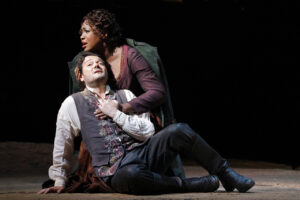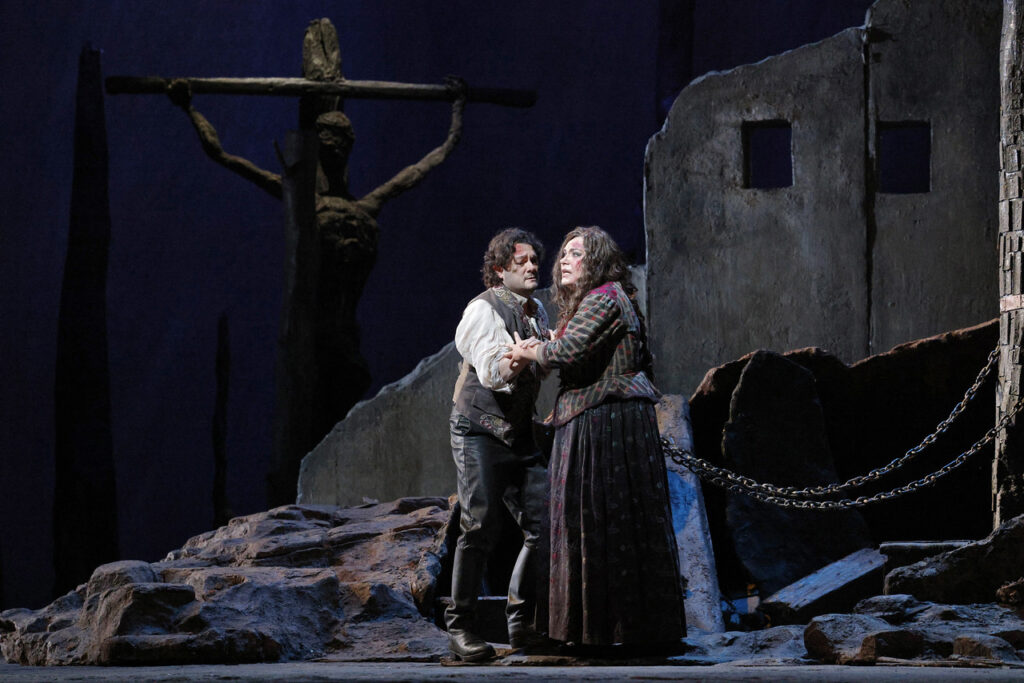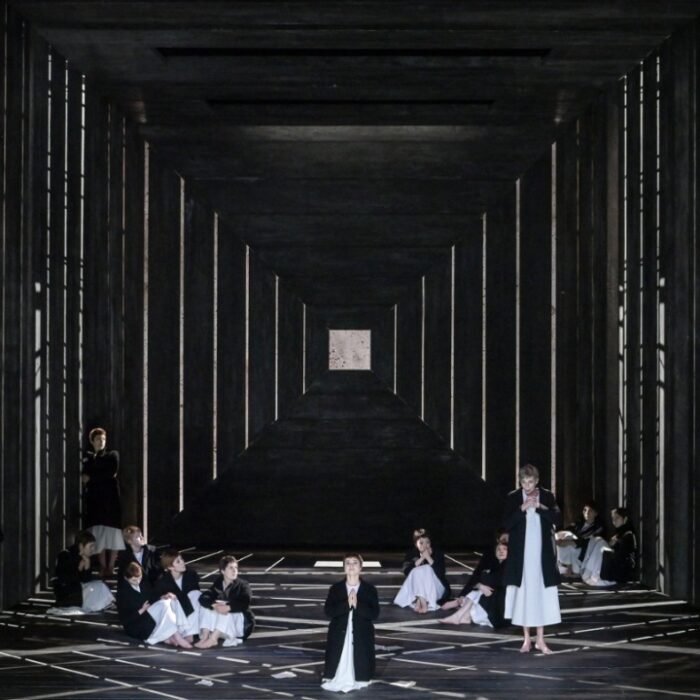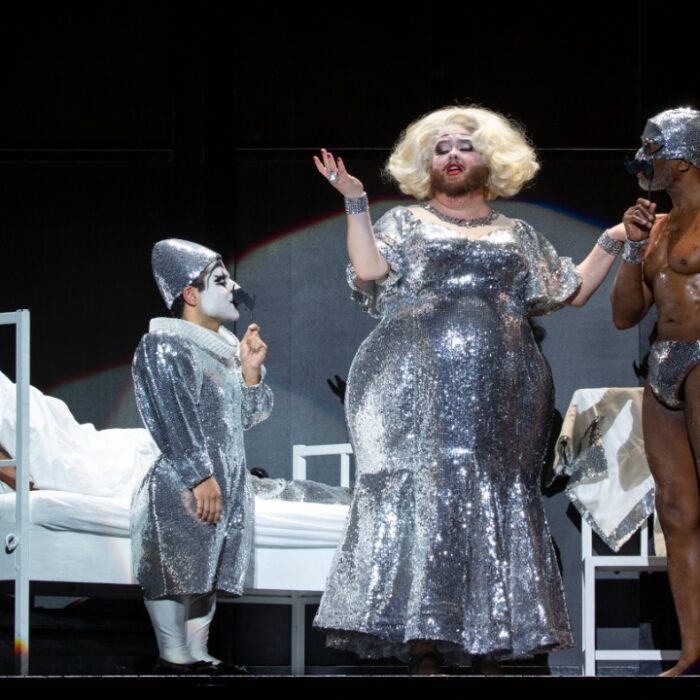
San Francisco Opera 2023-24 Review: Il Trovatore
By Lois SilversteinVerdi’s “Il Trovatore” conjures up fire from the outset like firelight. It burns and blazes with passion. It smolders. The more Verdi wrote, the more his imagination leapt into flames. One magnificent, powerful and engaging aria, duet, trio, quartet and chorus, emerging after the other. Dazzling. And what a story – an Italian troubadour with love affairs and babies tossed into fire pits, anvils clanging.
San Francisco Opera took on this fire to open its 2023 season, conducted by resident music director Eun Sun Kim, and brought its high-powered luster to the War Memorial Opera House to the applause of an appreciative audience. The sound was galore and brightness searing, but apart from the extravagant gorgeousness of the music, the overall production was somewhat paler than what we might have wanted. Did the flames burn down the roof? No. Did our hair catch on fire? No, although the possibilities were there. The singers at the ready, and with the wild libretto at hand, the orchestra tuned up for the trial. A good performance, but more workmanlike than a decisive call to the fire department.
However, the same mad story prevailed – infants tossed into the flames, identities confused, two men loving the same woman, a mother and her son locked in a powerful emotional embrace, along with vengeance on more than one character’s lips. No need to believe all the details, we just came into the opera house to surrender to the heat. But, in order to surrender we needed to linger over some of this opera’s complexities. For example, how Leonora found herself drawn to the Troubador, how the Troubador managed to love her as well as his wild Roma mother, Azucena, and what the scope of vengeance from one generation is to another. Also, what made the Count hate the troubadour when in fact he was his very own brother? Unfortunately, this production seemed more like a brisk glide over the story’s madnesses. It was a bit fast-paced for the usual lingering ardor and soaked-in feelings.
A Compelling Cast
We didn’t need to bow to the wild Roma Azucena, sung by well-known mezzo-soprano Ekaterina Semenchuk, or her band of Zingarelle to ascend to the stratospheric outlandishness. Instead, we would have been content to fly around in the orange-flames for a couple of hours. Semenchuk gave it every once in a while, not simply crazy expressions but ardent power, raw power, a distinctive dash of anger and revenge when she wanted. But, not consistently. Semenchuk’s mezzo dug the earth and climbed into the dark sky when she deemed it appropriate, but it also hovered over the silence of the grave with sounds that were indistinct and personal when she thought it was deserved. Her voice roamed too often in a private realm, even though we always knew where she stood.
As did Count di Luna, sung by Romanian baritone George Petean, making his San Francisco debut. He rose to the occasion in the second and final part of his performance. His baritone voice was flying loose and we actually believed he lusted after Leonora and would have died instead of his brother at the finale. But other times, he flailed across the stage warning everybody he was rising up to his power, but not quite doing so.
Manrico himself, sung by acclaimed Mexican tenor Arturo Chacón-Cruz, showed his lovely voice, but without sufficient embodiment. He lacked the yearning and pleading like that of the young troubadour. After all, he had a Roma mother to save, as well as a full-blooded sweetheart. Furthermore, when Leonora and Manrico discovered each other still alive, they stood static across from one another without any apparent eye contact or particular magnetic pull. Chacón-Cruz’s dulcet sound worked most movingly off stage when he sang to the harp-cum-lute, while Leonora cried achingly for him. He rose to the occasion of “Di quella pira” more than elsewhere but not to shake down the roof. Interestingly however, we could hear what Verdi would do in “La Traviata” as the two bade each other farewell. The downbeat of what became the exquisite farewell between Violetta and young Alfredo Germont in Paris, here is sounded in its first incarnation.
Angel Blue‘s performance was the strongest sound on stage. Her lustrous voice was vibrant and immediately resounded from the outset. Whatever she sang was rich and strong. She didn’t have to do much acting to convince anyone. Verdi, having provided her with the rich musical vocabulary that is Leonora, gave her just what she needed. Her trills and high notes were definitive and dedicated. In her “D’amor sull ali rosee,” she was always able to go further up in volume and range. In fact, she never faltered. Her acting met the needs of the heroine quite well, and when she needed to, she enriched her presentation more than beautifully. The scene in Act one where she grabbed Di Luna’s hand, thinking it was her Manrico, Angel Blue played it straight and yet searingly. Could she have teased it out further? Could she have taken more time to realize the extent of Leonora’s gaffe and show the range of the problems it unleashed? No doubt. But what she gave was direct and immediate. She emphasized a no-nonsense Leonora, determined and well-defined, steady and forthright. Never did she evince a doubt about who she was and what she was there to do. She was excellent and satisfying.
Some singers center their performance on the voice, while others illuminate the character with more psychological exploration by adjusting the volume, pulling out more pianissimo, rearranging their facial expressions, hand gestures and foot movement. Or even flexing their bodies to deepen subtleties. Others, simply sing out. Blue stayed somewhere in-between, sending her ringing tones out into the house while staying steady in her commitment to her particular vocal beauty. She was a Leonora worth fighting for. Aflame? Some might say. At the very least, more than vibrant and definitively alive.

(Credit: Cory Weaver)
The chorus, directed by John Keene, came alive more in the last act than with the rousing Anvil chorus in Act one. Although they carried out the scenic interchanges in the third act with the return of Ferrando, sung by Robert Pomakov, who did the job of showing “il popolo.” They were neither unusually fresh nor convincing. Sometimes as well, the diction seemed slurred and insufficiently loud enough, particularly when they were coming to abduct Leonora.
The monumental production, originally by Sir David McVicar and first presented in San Francisco in 2009, is now directed by Ray Rallo. The gigantic wall, the almost never-ending staircase, and the surging movement from one scene to the other, educated us as we proceeded to become more and more enmeshed in our affairs and activities that we don’t count as much as we think we do. This remained effective despite the continual shifting in every scene which became somewhat tiresome and distracting.
The pace of the conducting, along with some of the homogenizing of the depths of acting, the occasional facile activities of the chorus, and the standardized movement and gestures overall, kept the fire from burning too brightly. This “Il Trovatore” never took flight while keeping us on the edge of our seats. This was disappointing. But, Verdi and San Francisco gave “Il Trovatore” all the opportunity. The voices were available. The orchestra was willing. Was everybody too afraid to draw their swords? Was the melodrama just too embarrassing for our hard-boiled era to give over to?
The September Sunday afternoon too balmy to require high fire and misdemeanors so that we could at least warm the edge of our toes when we stepped back out into the dramatic dynamic of Azucena declaring to di Luna that the man he’d just sent to his death was his brother? Omigod. By itself it could bring the house down. Some might very well say that was all that was needed. Maybe so. I myself would have liked to feel the ends of my hair singed.


